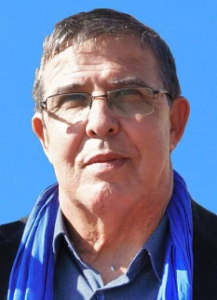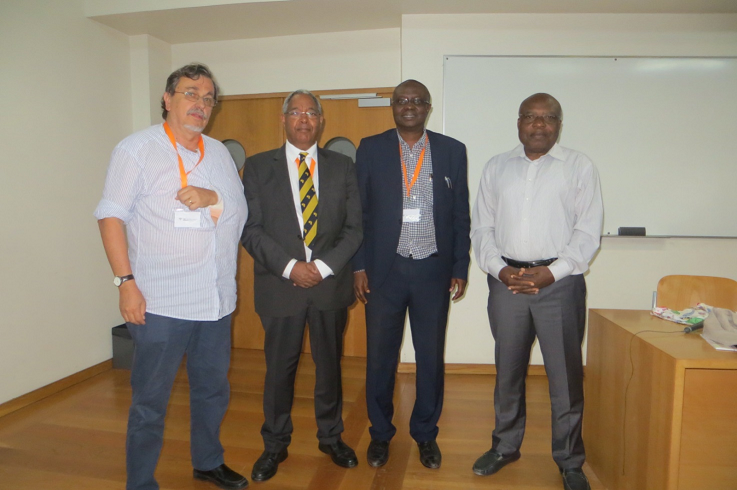A code for geoscientific fieldwork in Nigeria and Africa: Guidelines on health and safety issues in mapping, mineral exploration, geoecological research and geotourism
A code for geoscientific fieldwork in Nigeria and Africa: Guidelines on health and safety issues in mapping, mineral exploration, geoecological research and geotourism.
PRINCESS ALEXANDRIA AUDITORIUM (PAA), UNIVERSITY OF NIGERIA, NSUKKA, 06 – 09 NOVEMBER, 2018
http://geoscienceconference.unn.edu.ng/
The need to reinforce health and safety management issues in geoscientific and geoecological fieldwork in Africa is urgent. This is exemplified from the recurrent reports of missing participants, unsavory accounts of encounters with village heads, municipal authorities or section chiefs, motor vehicle accidents, hunting accidents, kidnappings, armed robberies, attacks by herdsmen, ‘vigilante groups’ or wild animals, unethical field procedures, common law duty of care, litigation, insurance considerations, and so on. It is surely not good publicity for any university if a student undertaking fieldwork is attacked, killed by wild animals, hijacked, injured by landmine, catches malaria, or, worst, shot by a hunter and dies in the field.
The theme of the Conference: ‘A Code for geoscientific fieldwork in Africa’ could never have been more apposite at this time, as we continue to record more and more of these tragic incidents. The aim is to demonstrate unequivocally that most of the risk encountered during geoscientific and geoecological fieldwork in Africa can be reduced, or, in some instances, be obviated altogether, by knowledge, experience, adequate preparation and strict observance of appropriate health and safety precautions.
The Conference will bring to light the virtual absence of regulatory guidelines in conducting geological fieldwork by many geoscience departments in Africa and some mineral exploration and mining establishments, and would highlight the importance of mitigating health and safety challenges identified from the ethical, legal, economic and other dimensions.
Invited veterans in African field geology would incorporate in their keynote addresses, a rich and diverse set of fieldwork experiences, insights and reflections on conducting geoscientific fieldwork in Africa, the problems that emerge, the solutions that were developed, and the realities of being ‘in the field’. The focus will be on provision of hands-on approaches to conducting geoscientific fieldwork safely in a range of African settings, exploring the methodological considerations that engender risks and safety aspects, offering strategies to mitigate these, and provide guidelines for maintaining geodiversity and geoheritage.
The Conference is a “must attend”, for it will provide an essential guide to health and safety for geology undergraduates and postgraduate students in tertiary geoscience institutions, academics, mineral explorationists, geoecological researchers, nature conservationists and geotourists in Africa and from abroad. The Project can be considered from a more generic perspective as well, as many African fieldwork experiences in the geosciences can be compared with those encountered in other scientific fieldwork endeavours, such as in the life sciences and in ecology.
Supporting roles on articulating health and safety policy guidelines and ergonomics would be provided by invited professionals in the medical, legal, insurance and geological hardware and equipment supply fields.
A number of short training courses will be organised on topics related to the Conference theme, such as: “Medical Geology Curriculum and Appropriate Field Project Selection”, ‘Safety Requirements in Well Logging’ and “Administering First Aid and Emergency Care in the Field”.
WELCOME TO FEZ, MOROCCO (CAG28)
In 2020, we have a great chance to visit and meet at the “geologist’s paradise”.
By Prof. Youssef Driouch
The next Colloquium of African Geology (CAG 28) will be held at Fez University (Morocco).
Morocco situated at the NW corner of African continent is close to Europe and Middle East. Morocco is called “Geologist’s Paradise” (Géologues. SGF, n° 194. September 2017) because of: 1) the diversity of very well outcropping terranes spanning from Archean to Quaternary; 2) the location at a triple junction between Africa, Atlantic Ocean and the Alpine belt system; 3) the particular topography, Toubkal is the highest non-volcanic summit in Africa; 4) All rocks types are represented. Sedimentary, magmatic and metamorphic terranes in diverse tectonic systems from sedimentary basins to metamorphic fold belts; 5) Fossils, minerals and meteorites are famous, exposed in natural museums in many countries, they attract a large number of curious and specialists; and 6) natural resources are various and important. The main of them are: phosphates of late Cretaceous and early Cenozoic formations, Morocco has the largest resources and is the largest producer of phosphates and derivatives; Rare metals and REE Au, Ag, Co in Proterozoic Ore deposits (Anti-Atlas) with the famous world class Imiter and Bou Azzer mines, Au, Pb, Zn, Barite et Fluospar in Paleozoic terranes. Oil and gas on and off shore explorations are currently very active with many positive indicators.
Situated in central northern Morocco. Fez is the cultural and spiritual capital of Morocco. Fez hosts three universities: Al Quaraouiyine University founded in the 9th century and considered the oldest university in the world according to UNESCO and Guinness World Records. USMBA University was founded in 1975. It comprises many faculties: Medicine, Pharmacy, Law and Economics, Arts and Humanities, engineering schools and 2 faculties of sciences and their geology departments. The third University is the private Euro-Mediterranean University enclosing business, architecture, political and engineering high schools.
A strong Moroccan team is doing its best to provide a very rich and fruitful CAG28 session for all African and worldwide geologists, with friendly, professional and scientific exchanges as the main goals. More information will be available on GSAf communication platforms.
Warmest Greetings and Welcome to Fez
27th Colloquium of African Geology (CAG27) and 17th Conference of the Geological Society of Africa (GSAf17)
From 21 to 28 of July, 2018, more than 250 scientists from Africa and all over the world attended the27th Colloquium of African Geology (CAG27) and 17th Conference of the Geological Society of Africa (GSAf17) which were held at the University of Aveiro, Aveiro, Portugal.
This event was sponsored by the Universidade de Aveiro and the GeoBioTec Research Centre, under the auspices of the Geological Society of Africa. The event was an opportunity to continue the scientific exchanges between researchers from all over the world in the field of Geosciences, and to demonstrate the high scientific research standards that are being carried out over the world. The participants in the conference had the opportunity to share their expertise in a range of scientific fields, such as geology, geological resources, environmental risks, environment and human health, sustainable development, education, and tourism in Africa.
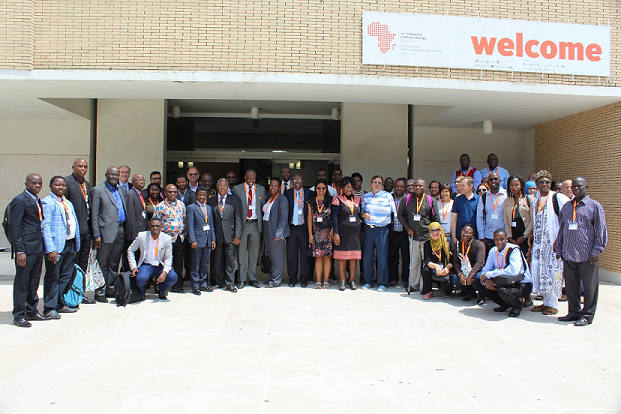
A group photo of the participation during the CAG27
The CAG27 has received considerable international attention from around the world. More than 250 researchers from 38 countries (Algeria, Australia. Austria, Belgium, Brazil, Cameroon, Czech Republic, Dem. Republic. Congo, Dem. Republic of Korea, Egypt, Ethiopia, France, Gambia, Germany, Ghana, Italy, Kenya, Madagascar, Mali, Morocco, Mozambique, Namibia, Nigeria, Malawi, Norway, Portugal, Republic of Korea, Rwanda, Senegal, South Africa, Sudan. Tanzania, Togo, Tunisia, Uganda, United Kingdom, Zambia, and Zimbabwe) joined the conference, highlighting the importance of this event.
The conference has been organized into 5 days sessions that included a wide range of topics, such as: S01 – Crustal Evolution of Africa value; S02 – Igneous and Metamorphic Petrology; S03 – Tectonics and structural geology; S04 – Stratigraphy, Sedimentology & Paleontology; S05 – Isotope Geology; S06 – Earth’s mineral resources and sustainable development; S07 – Weathering, Climate and Surface Processes; S08 – Geophysics; S09 – Ocean Sciences; S10 – Geoparks, Geotourism and Geoethics for Promoting Earth Heritage in Africa; S11 – Geohazards, Natural and human-induced environmental hazards and disasters; S12 – Geosciences Education in Africa; S13 – Integrated approaches in Geology (Medical Geology, Geophysics and Geochemistry).
The Scientific Committee compiled an interesting program of oral and poster presentations. The CAG27 local committee together with the Scientific Committee have compiled the accepted abstracts in the “Book of Abstracts” which was edited by Eduardo Ferreira da Silva, Carla A. Figueiredo Patinha, Nuno Durães, Carla Candeias; and published by UA Editora, Universidade de Aveiro, with ISBN 978-972-789-557-1.
The conference included 5 relevant Plenary Lectures (S. Felix Toteo, Luis Filipe de Menezes Pinheiro, Rui Manuel Soares Dias, Lahcen Daoudi e K’tso Nghargbu), 5 Keynotes (João Mata, Rui Castanhinha, Fernando Tavares Rocha, José Feliciando da Silva Rodrigues e João F.B.D. Fonseca), 2 workshops, as well as 165 oral presentations, organized in 3 parallel sessions and also 83 poster communications. To complement the conference’s academic program, the Local Committee has also organized two post-conference technical field trip to visit the (a) Thermal/SPA Complex of S. Pedro do Sul and regional geology and (b) the Lourinhã Formation, the paleobiodiversity of Portuguese Upper Jurassic dinosaurs.
In additional to the scientific program, the CAG27 hosted two days’ workshop under the title of “Kick-off workshop for the AU-AMREC working group”. The workshop was facilitated by the African Union Commission.
The Geological Society of Africa General Assembly was held on the Thursday of 25 July, 2018 as a part of the activities during the CAG27 and the GSAf17.
The Geological Society of Africa acknowledges the Scientific Committee for their reviewing of the conference papers, and the Local Committee for their hard work in the organization which made another great event.
New Newsletter editor
Since 2011, Prof. Lopo Vasconcelos acts as GSAf’s newsletter editor and information officer for the society. During his service, Prof. Vasconcelos produced 118 issue of the newsletter. In 2018, Prof. Vasconcelos decided to retire from the editor position. The GSAf thanks Prof. Vasconcelos for his time that was given to serve the society.
The GSAf council nominated Dr. Tamer Abu-Alam (the Councillor for Northern Africa) to replace Prof Lopo Vasconcelos as the new GSAf’s newsletter editor and information officer. The GSAf General Assembly unanimously agreed to the nomination.
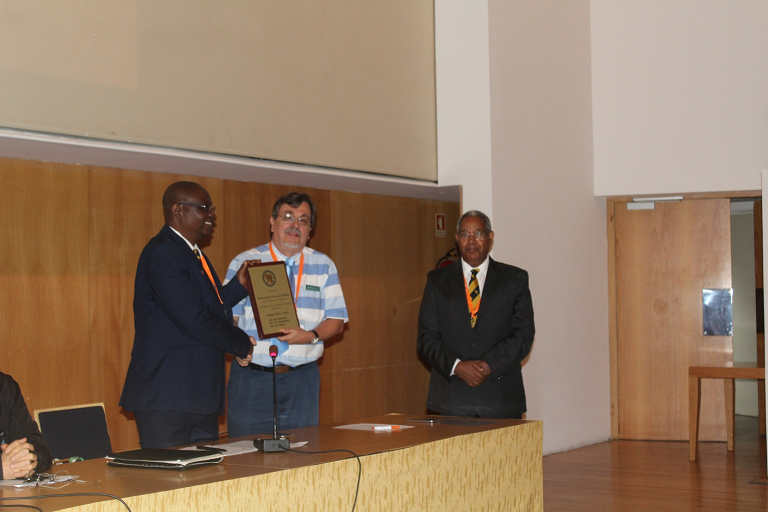
GSAf acknowledges Prof. Lopo Vasconcelos for his service to the society. From left to right: Prof. Gbenga Okunlola (President of GSAf), Prof. Lopo Vasconcelos and Prof. Aberra Mogessie (Past president of GSAf).
A New frame of the GSAf’s Newsletter
After a discussion of the Geological Society of Africa’s council, the council decided to publish the newsletter regularly four times per year (March, June, September, and December). The society will communicate with its members weekly throughout automatic emails that contain important information. As a result, the council is working now to clean up the member database and design a new website. The council encourages the members to contribute to the newsletter and the weekly news emails.
GSAf Fellowship Award
The GSAf is pleased to announce that Prof. Felix Toteu, Prof. Aberra Mogessie and Prof. Lopo Vasconcelos received GSAf Fellowship Award for their contributions to the growth and activities of the GSAf. Since their contributions to the society cannot be covered in an issue, their contributions to Africa and Earth sciences will be in the focus of the next issues of the newsletter.
GSAf Fellowship Award. From left to right: Prof. Lopo Vasconcelos, Prof. Aberra Mogessie, Prof. Gbenga Okunlola (President of GSAf) and Prof. Felix Toteu.
New Councillor for Northern Africa
By nominating and electing Dr. Tamer Abu-Alam as the new GSAf’s newsletter editor and information officer, the position of Northern Africa councillor fell vacant. The GSAf council had received 5 applications for the position (3 from Morocco, 1 from Algeria and 1 from Egypt). Only the Egyptian candidate was present and she presented to the Assembly her perceived contribution if she is elected. The General Assembly elected Dr. Kholoud Abdelmaksoud as the new councillor for Northern Africa. The council thanks our colleagues from Morocco and Algeria who showed interest to serve the society and wish all the success to Dr. Kholoud Abdelmaksoud as the new councillor for Northern Africa.
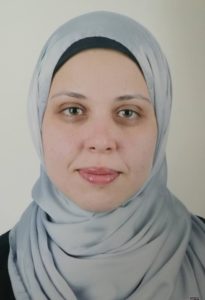
Dr. Kholoud Abdelmaksoud – the new councillor for Northern Africa
Homage of Prof. Serrano Pinto
From Africa, he started his career and he kept Africa all the time in his heart – “Prof. Serrano Pinto”
Prof. Serrano Pinto was born in Portugal, on 5 March 1936 and passed away suddenly after returning from his participation in CAG21 in Johannesburg on 15 January 2011. Prof. Serrano Pinto was the Goodwill Ambassador of the Geological Society of Africa to Portugal. During the opening ceremony of the CAG27, both the Geological Society of Africa and the local organizing committee paid a tribute to Prof. Serrano Pinto for his role in both the Geological Society of Africa and the University of Aveiro.
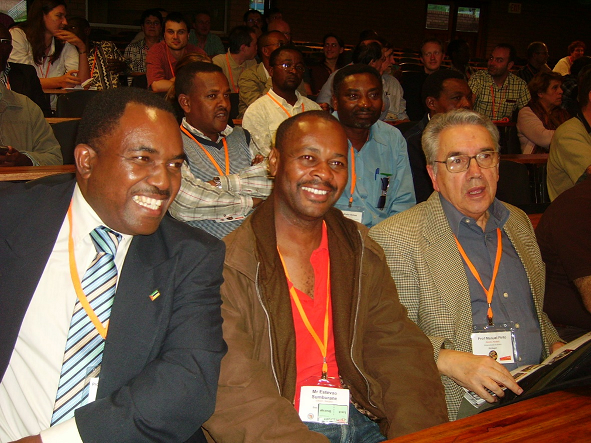
Prof. Serrano Pinto to the right with colleagues from Mozambique during one of the Colloquiums of African Geology.
Prof. Serrano Pinto studied his first geology classes at the University of Coimbra and the University of Oporto. Later during his military service, he left to Mozambique where he received an invitation to integrate the Geology and Mines Services. At the time, Mozambique was developing an ambitious cartographic and prospecting programme that required highly qualified professionals. Then, he went to Leicester, UK, to focus on his Master degree in Geochemistry. He published during this period many works that mark a turning point towards systematic mineral prospecting based on sediments of Mozambique. After a brief stay in Angola (1974) he pursued his activities at the recently created University of Aveiro (1973). After a meeting on Plate Tectonics that was held at the University in 1976, he started his PhD degree on the geochemistry and geochronology at Leeds University. After concluding his PhD program, he and other colleagues lead to the creation of Isotopic Geology Laboratory at the University of Aveiro.
In 1996, he was one of the founders of the Group of History of Science and Technology at the University of Aveiro, later established as Centre for the Studies of History and Philosophy of Science and Technology of the University of Aveiro. Prof. Serrano Pinto was in charge of the Centre Secretary Board serving as its Secretary and persistently stayed leading it. From 1997 until 2000 the Centre published a Newsletter with articles on the history of science by many of the active Portuguese historians of science, always with an article signed by Prof. Serrano Pinto (the Secretary Board).
He co-organized around 12 conferences on the Geochemistry domain and 4 international on the History of Science. He published around 12 books or book chapters; 6 geological maps of Mozambique and Portugal; 8 papers in journals from the SCI or as selected papers, more than 80 peer-reviewed as well as several proceedings in international meetings.
Sincere condolences
Prof. Driss Fadli from Mohamed V University (Rabat, Morocco) Passed away on Monday, 25th of August, 2018. He was a famous militant geologist. His activities was focused last years on how to highlight the geologic, cultural and touristic assets of Jbel Bani Geopark (https://www.facebook.com/BaniGeopark/). On behalf of the GSAf staff as well as of his Moroccan and African friends and colleagues, we present here our sincere condolences to Prof. Fadli family. The Geology is mourning in Morocco. Rest in peace our dear Driss.
